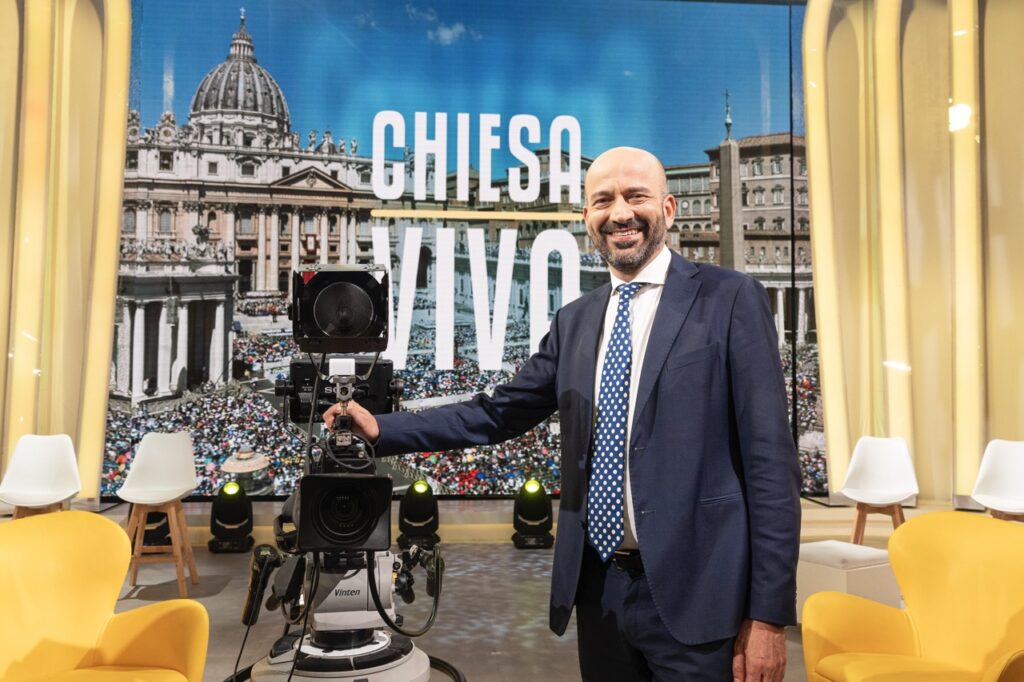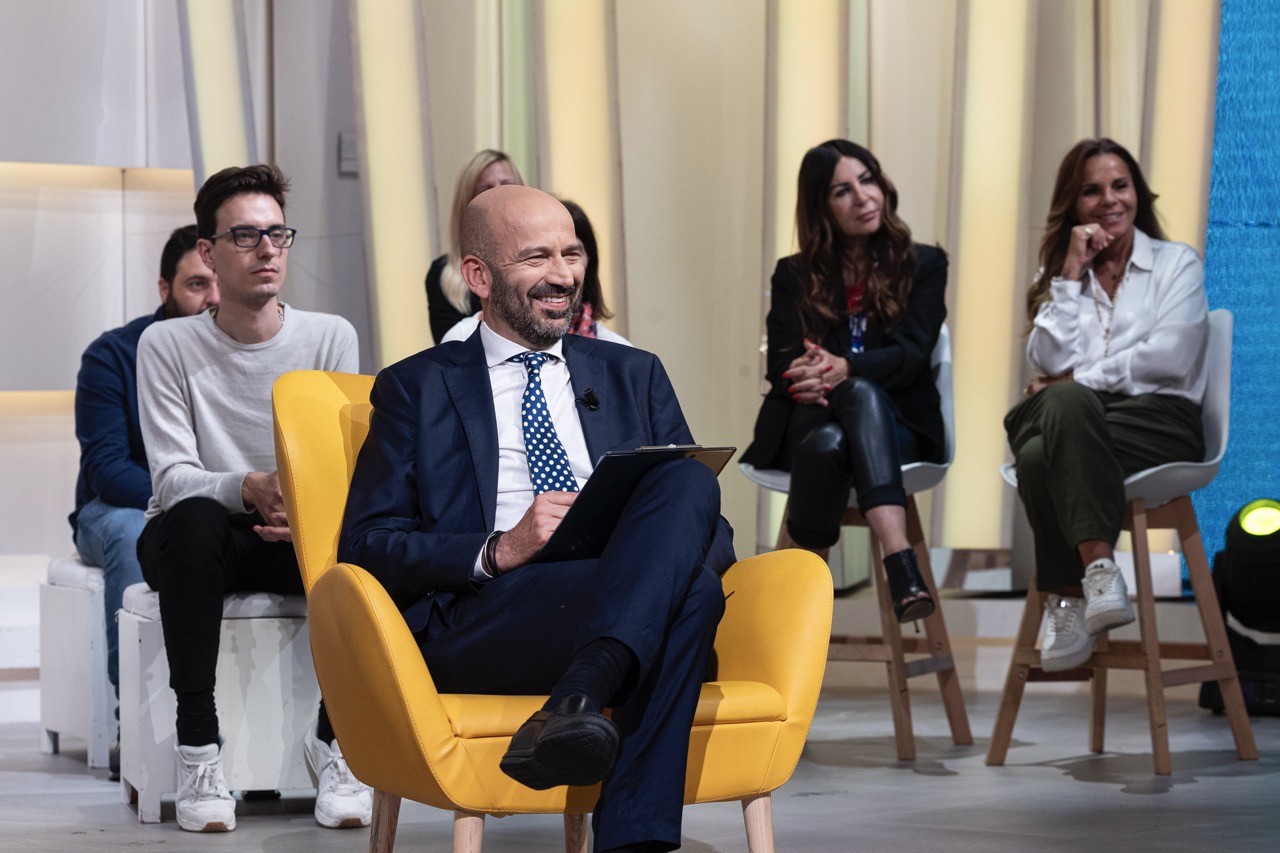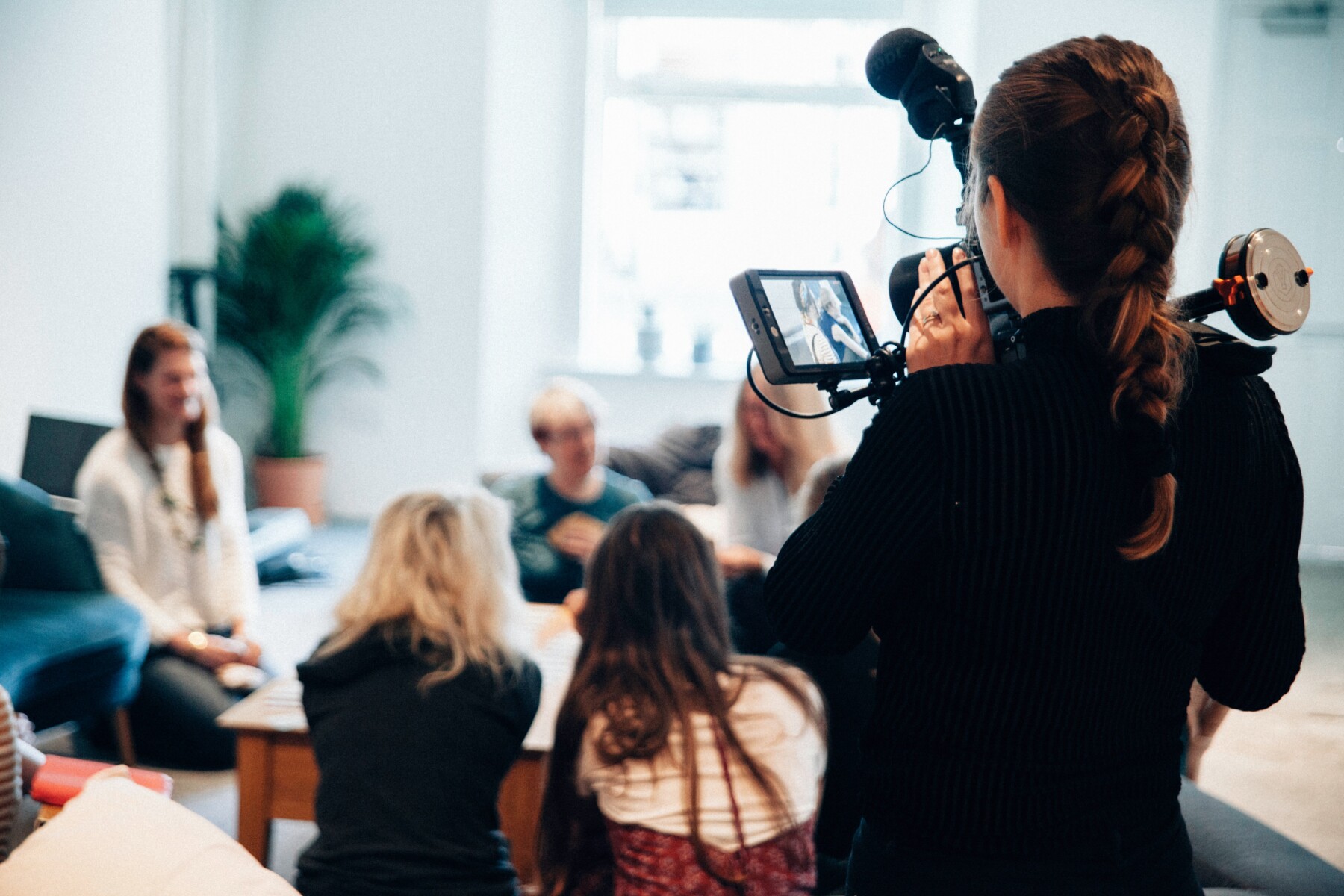“Tv2000 listens and tells stories without making noise, aiming to shed light” – Interview with Gennaro Ferrara

In a transforming media landscape, Gennaro Ferrara stands up for the value of a kind of television that informs with meaning and humanity.
Gennaro Ferrara has been working for 24 years as a journalist, writer, and TV host for Tv2000, the broadcaster of the Italian Episcopal Conference. Among several programs, he has hosted Il Diario di Papa Francesco and Le Parole della Fede. He is currently on air with Chiesa Viva, which focuses on the papacy of Leo XIV, the Jubilee, and the synodal journey. We met with him to reflect on media and communication in such a complex moment in time, as television undergoes a transformation period—caught between traditional broadcasting, digital platforms, and streaming.
Gennaro, what uniquely positive qualities does free-to-air television still preserve?
There’s no doubt we’re going through a period of change, and it’s hard to imagine where it will all lead. As of now, the main positive element that generalist TV still preserves, in my opinion, is its ability to offer a comprehensive package, based on a relationship of trust with the viewer, and to continue offering a broader look at reality. Let me explain: online content consumption is tailored to the individual. Generalist TV, on the other hand, by definition, caters to a wider audience. It doesn’t speak to the needs of the individual, but to those of a community. In doing so, it not only provides a wider snapshot of the cultural context, but, in a sense, helps to shape it.
In this ongoing state of change, what are the fixed points, the main characteristics, goals, and challenges of Tv2000?
Tv2000’s offering is very cohesive, with a Christian-oriented outlook that shapes the entire programming schedule. A common thread connects news, entertainment, and talk shows: a unifying spirit that stems from a Christian reading of society, but that never slips into propaganda or mere ideological battles. Our style is to create genuine spaces for dialogue, respecting people, especially when they are the subject of the story. Tv2000’s programs offer surprisingly in — depth exploration. Even when covering cinema or theatre, the famous faces they host reveal a particular depth and insight, different from the usual. Tv2000 knows how to listen and tell stories with depth, without making noise but trying to shed light.
And now it does so through the Play2000.it platform as well.
Tv2000 is embracing the challenge of change with this fully operational project, which we’re proud of. It’s not simply about providing web access to our existing content but about reworking it with a different language and offering new content designed specifically for the Play2000.it space.

A (large) part of TV caters to the spectacularization of pain and fear and evil. How important is it for television to convey trust and tell stories of hope and the positive aspects of the world?
I’m not interested in judging others or making moralistic speeches. Telling about the good shouldn’t lead to presenting a reality that doesn’t exist. I believe the effort of everyone — certainly Tv2000’s — is to tell the truth, which means talking about both good and evil. In telling, however, there is not only the object, but also the way you relate it, and from that point of view we must avoid the danger of oversimplification. For one can tell good things in an overly bad way — like when they are told with a fantastic emphasis.
You said even evil must be told…
With the aim of contributing to the formation of a non-muscular culture, as Pope Leo XIV said when meeting journalists in the aftermath of his election. Communication needs to avoid forcing people to take sides and, instead, help them understand reality and the other’s point of view. Pope Leo talked about a communication with the ability to listen. I think that’s the challenge we all face, and it’s the direction firmly followed by Tv2000: listening and telling a reality, making it an opportunity for dialogue and comparison, not for taking sides. Dividing the world into good and bad is a temptation that might bring in views, but it doesn’t help understanding. The culture of peace itself must be based on justice and truth.
In times like ours, when the entire communication landscape is changing, what is the journalist a guarantor of? How does he differ from other communicators?
The journalist is a guarantor of the truthfulness of what he reports. We are being flooded with more news than ever before, but among it, there are fake news and information that is not false, but crafted in a suggestive way, tailored to our profile, to cater to instincts and prejudices. The journalist must certify and verify the news and, at the same time, by reporting them, offer a plural point of view. It’s the journalist’s duty to broaden the vision of their audience.

For the journalist, in such a delicate historical and geopolitical context, is there only (so to speak) the task of reporting reality, or also the possibility of fostering fundamental concepts such as peace, brotherhood, and humanity?
Values cannot be separated from reality. For a journalist, values must be reported when they are facts, not mere principles. The challenge, then, is to recognize them and tell their story. Let me give you an example: Pope Leo XIV experienced Covid in Peru, while serving as bishop of Chiclayo. It was a particularly harsh time there, with a black market for oxygen being sold at extremely high prices, unaffordable for many people who were dying from Covid. He was able, in a very short time, to organize a fundraising campaign to build machines that could produce oxygen, and to distribute it for free on the streets of Chiclayo. When talking about Covid deaths in Peru, a journalist has the duty to tell this story: true, important, and meaningful because it saved human lives. A story that matters just as much as the one about the black market for oxygen in Peru and the number of Covid deaths. Talking about it means telling people the whole story of the world, and in the whole world, there are reasons for hope.
Does this also apply to war?
Even in the tragic reporting of war, alongside the bombings and the children dying of hunger in Gaza, the story of international politics returning to the law of the strongest, beyond the emphasis given to the words of the powerful (that must also be reported) … It is possible to provide a service that does not simplify the narrative into good and bad, that recovers a multilateral and internationalist view of events, that remembers the value of peace and that gives voice to the peoples who want it – not only to the warlords.
Television itself is made up of different souls: news and entertainment, documentaries and talk shows. They are all parts of the same body, in a way. Perhaps the common thread lies in the stories we choose to tell – the testimonies we offer to the viewer. How important are good stories? How important is it to seek out the right ones?
It’s crucial, even just from a survival standpoint: the more beautiful and interesting the story is, the more people will watch it. But what really matters to me, working on a daily talk show, is finding people whose lives actually match the story being told. Many can tell stories — far fewer can live them. The audience shouldn’t be fooled. You have to find people with real, lived experience.

Foto Unsplash
Not by chance, Tv2000’s slogan is Autentici per vocazione, which means “authentic by vocation”.
I’ve been at Tv2000 for over 20 years, and I’ve found a space for expressive freedom that I don’t often see elsewhere. That’s where authenticity lies: even with a very clear cultural identity — because Tv2000 does have a clear cultural identity and a very defined programming schedule — nothing is developed in an oversimplified way. If we – and I, in my current program Chiesa Viva — focused solely on devotional and celebratory aspects, we wouldn’t be authentic. We’d be doing propaganda for the Church, ultimately doing it a disservice. The idea, instead, is to try to put values and faith to the test of real life. We want to grow together with our viewers. It’s not easy. Personally, I find a big difference between guests who convey something truly alive and those who convey something merely theoretical. Authenticity is the telling of life – not of abstract ideas, and not even of religious doctrine.
The word responsibility also comes to mind, given the power of television in shaping the masses. How important is this word for those who do this job?
Responsibility is a crucial and central issue — it concerns everyone. We must be extremely careful with the words we speak. Pope Leo XIV, in his meeting with journalists, quoting Pope Francis, spoke about disarming communication: weighing and choosing words carefully. Pope Francis said that words can kill. We must have absolute rigor in the choice of words, because words create language and culture, even those we write on our social media. Being a journalist at Tv2000, in this sense, is kind of a school, one whose teachings we try to carry over into our daily lives.
One last question about young people. What is their relationship with television? How difficult and important is it to reach them? What is Tv2000’s approach toward them?
It seems to me that today’s young people only watch TV indirectly. On Saturday evenings, Tv2000 offers family films in an attempt to bring parents and children together, giving them the chance to feel emotions and reflect together. I think that’s important. More broadly, we really try to give young people a voice — not idealized youth, but real ones. That’s what we’ll aim to do during the Jubilee dedicated to them. Of course, the relationship between young people and television is part of that big lingering question we talked about at the beginning. However, it must be said, we’ve called time on certain media only to see them make a comeback.

